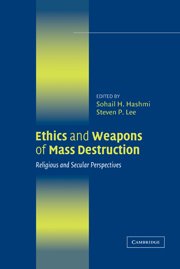Book contents
- Frontmatter
- Contents
- Tables and Figures
- Acknowledgments
- Abbreviations
- Ethics and Weapons of Mass Destruction
- Introduction
- 1 Weapons of Mass Destruction: A Brief Overview
- 2 The International Law Concerning Weapons of Mass Destruction
- PART ONE THE ORIGINAL DEBATE
- 3 Realist Perspectives on Ethical Norms and Weapons of Mass Destruction
- 4 Realism and Weapons of Mass Destruction: A Consequentialist Analysis
- 5 Natural Law and Weapons of Mass Destruction
- 6 War and Indeterminacy in Natural Law Thinking
- 7 Liberalism: The Impossibility of Justifying Weapons of Mass Destruction
- 8 A Liberal Perspective on Deterrence and Proliferation of Weapons of Mass Destruction
- 9 Christianity and Weapons of Mass Destruction
- 10 Christian Apocalypticism and Weapons of Mass Destruction
- PART TWO EXPANDING THE CONVERSATION
- PART THREE CRITICAL PERSPECTIVES
- Contributors
- Index
7 - Liberalism: The Impossibility of Justifying Weapons of Mass Destruction
Published online by Cambridge University Press: 05 June 2012
- Frontmatter
- Contents
- Tables and Figures
- Acknowledgments
- Abbreviations
- Ethics and Weapons of Mass Destruction
- Introduction
- 1 Weapons of Mass Destruction: A Brief Overview
- 2 The International Law Concerning Weapons of Mass Destruction
- PART ONE THE ORIGINAL DEBATE
- 3 Realist Perspectives on Ethical Norms and Weapons of Mass Destruction
- 4 Realism and Weapons of Mass Destruction: A Consequentialist Analysis
- 5 Natural Law and Weapons of Mass Destruction
- 6 War and Indeterminacy in Natural Law Thinking
- 7 Liberalism: The Impossibility of Justifying Weapons of Mass Destruction
- 8 A Liberal Perspective on Deterrence and Proliferation of Weapons of Mass Destruction
- 9 Christianity and Weapons of Mass Destruction
- 10 Christian Apocalypticism and Weapons of Mass Destruction
- PART TWO EXPANDING THE CONVERSATION
- PART THREE CRITICAL PERSPECTIVES
- Contributors
- Index
Summary
Supreme emergency has become a permanent condition. Deterrence is a way of coping with that condition, and though it is a bad way, there may well be no other that is practical in a world of sovereign and suspicious states.
Michael Walzer, Just and Unjust Wars.Deterrence itself, for all its criminality, falls or may fall for the moment under the standard of necessity. But as with terror bombing, so here with the threat of terrorism: supreme emergency is never a stable position. The realm of necessity is subject to historical change. And, what is more important, we are under an obligation to seize upon opportunities of escape, even to take risks for the sake of such opportunities.
Ibid.It is my purpose to side with the Michael Walzer who urges taking risks to bring about historical change in what is necessary and against the Michael Walzer who settles for coping, however reluctantly, with a supposedly permanent supreme emergency that is claimed to excuse the criminality of threats of mass destruction with nuclear weapons. In the process I hope to demonstrate the failure of one of the most comprehensive attempts to justify nuclear deterrence – and thus a reliance on the most highly developed weapons of mass destruction – in a manner consistent with liberalism.
- Type
- Chapter
- Information
- Ethics and Weapons of Mass DestructionReligious and Secular Perspectives, pp. 139 - 162Publisher: Cambridge University PressPrint publication year: 2004
- 5
- Cited by



